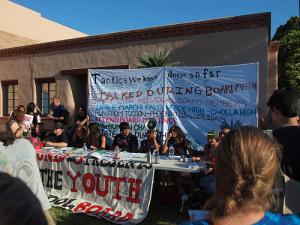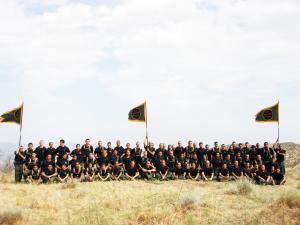On April 26, eight high school students ran from their seats in the audience of a Tucson, Arizona district school board meeting shortly before it was scheduled to begin, and occupied and chained themselves to the chairs of the board members. The students were there to defend the district’s Mexican-American studies program, under threat by new legislation that put ethnic studies curriculum in peril throughout the state. (See raw footage in first video below text)
The action  Tucson student organizers (Flickr: cplqn)forced the district board to postpone the meeting until May 3, and this time officials responded as expected in Southern Arizona’s emerging homeland security state: more than 100 police equipped with anti-riot gear guarded the doors. This even had Tea Party pundit Glenn Beck talking.
Tucson student organizers (Flickr: cplqn)forced the district board to postpone the meeting until May 3, and this time officials responded as expected in Southern Arizona’s emerging homeland security state: more than 100 police equipped with anti-riot gear guarded the doors. This even had Tea Party pundit Glenn Beck talking.
In 2010, the now-famous SB 1070 wasn’t the only anti-immigrant/anti-Latino legislation passed in Arizona. Also passed was HB 2281, a law that outlaws any program designed for a “particular ethnic group,” that advocates “ethnic solidarity,” or the “overthrow of the United States government.” Now the auditors from the state of Arizona are coming to Tucson to make sure area high schools are meeting these provisions.
One of the books that might incite such an ethnic revolution, according to the Arizona Attorney General Tom Horne, is Pedagogy of the Oppressed, by Brazilian educator Paolo Freire, a book known for its ground-breaking ideas promoting critical thought and engagement with issues in marginalized communities, especially in situations of vast structural inequality.
While this type of critical thought and engagement is under attack in Arizona, another form of “education” seems to be flourishing. This education may be found in the Boy Scouts of America Law Enforcement Explorer program. In the U.S.-Mexico borderlands this is an after-school and weekend program for teenagers under the tutelage of the U.S. Border Patrol. Whereas before September 11, 2001 the  Explorers (Credit: U.S. Customs and Border Protection)program was more about the “basics,” as Border Patrol agent Johnny Longoria told The New York Times, since then the emphasis has been “on terrorism, illegal entry, drugs and human smuggling.” This is, as the below Fox 7 reporter announced (the second video under the text), “good news for the Department of Homeland Security,” which year after year has more and more demand for border-enforcement agents.
Explorers (Credit: U.S. Customs and Border Protection)program was more about the “basics,” as Border Patrol agent Johnny Longoria told The New York Times, since then the emphasis has been “on terrorism, illegal entry, drugs and human smuggling.” This is, as the below Fox 7 reporter announced (the second video under the text), “good news for the Department of Homeland Security,” which year after year has more and more demand for border-enforcement agents.
The contrast between the Explorers and the ethnic studies fight in Tucson creates a glimpse into the homeland securitization of the education process in the borderlands. In the United States national security is the frame used by officials and the media to debate, push, and implement border policy concerning migrants, drugs, and “terror.” And now this frame is being placed squarely onto education. Militarized border enforcement has become the classroom.
Getting rid of any type of education which promotes critical thought about such racialized and potentially classist initiatives is another part of the effort to create the fertile ground for such a homeland security state to thrive. However, this fertile ground might have some obstacles if these Tucson high school youth have anything to say about it.

